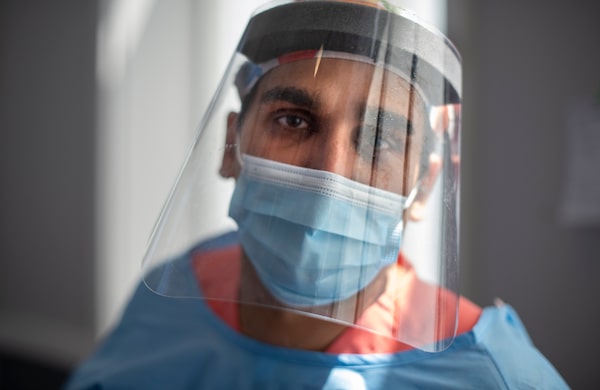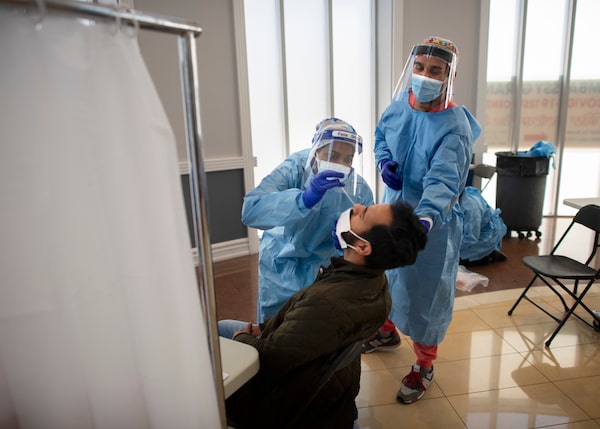
Dr. Raj Grewal, Medical Director of the COVID-19 testing centre at the Embassy Grand Convention Centre in Brampton, Ont., on May 12, 2021.Fred Lum/The Globe and Mail
As an emergency physician, Raj Grewal knows how difficult it can be to seek medical help when language is a barrier. He sees it all the time with his South Asian patients at Hamilton Health Sciences – the relief on their faces when he switches from English to Punjabi and they can finally speak to someone in a language they understand.
In Brampton’s L6P neighbourhood, where Dr. Grewal grew up, that language barrier was having dire consequences during the pandemic. Some 60 per cent of L6P residents are South Asian, and with a COVID-19 positivity rate of 20 per cent – more than three times the provincial average – he knew it was crucial to get out the message about testing and other public-health measures in languages community members could understand.
In November, he teamed up with his respirologist wife, Anju Anand, and his mom, Paramjit Kaur Grewal – who still lives in L6P – to create a short video in Punjabi instructing residents how to get tested. Then they fired it off on WhatsApp, the messaging platform of choice among the South Asian community. The video was shared hundreds of times. Dr. Grewal himself even had it sent back to him by loved ones.
Canada vaccine tracker: How many COVID-19 doses have been administered so far?
Since then, the 46-year-old physician has become a key figure fighting the pandemic in ravaged L6P. In the wake of the video’s success, he co-founded the South Asian COVID Task Force, whose mission is to create public-health messages targeted specifically at immigrant communities, help tackle the spread of misinformation and advocate for greater support. And in January, he became medical director of the newly created Embassy Grand Testing Centre, a privately run testing site funded by Ontario Health and located in the heart of L6P, where many people work in essential jobs and live in multigenerational homes, putting them at greatest risk of contracting the virus.
And he has done it all while still working as an emergency doctor and assistant professor at McMaster University.
“I am a doer,” Dr. Grewal says. “I knew I had to step in and help.”

Dr. Grewal, right, helps Shivar Annamalai administer a COVID-19 test.Fred Lum/The Globe and Mail
Since the Embassy Grand site opened five months ago, it has become one of the province’s busiest testing centres. Key to its success is a multilingual phone and online system that gives residents the option of booking in Hindi, Punjabi, Gujarati and Urdu.
Lawrence Loh, the Medical Officer of Health for the Region of Peel, says Dr. Grewal’s work has been “indispensable” in bridging the gap with the South Asian community and helping boost the number of people being tested. “We’ve seen a testing uptake through their site,” says Dr. Loh. “Raj brings medicine and cultural expertise within the same persona. That is really what has made him so effective. He’s an important leader.”
The notion of giving back is deeply ingrained in the Grewal family. His parents had nothing when they moved to Canada from Punjab, and they shared a crowded home in L6P with Raj’s grandparents and assorted visitors from India. His mother spent 15 years volunteering in nursing homes across Peel and instilled the notion of seva – a major tenet of the Sikh religion that means to provide help and service to others without expectation of reward – in her son.
Raj never shied away from hard work. Throughout university, he worked in the stockroom at Canadian Tire, cleaning floors and doing manual labour – a job he says helped him view everyone, regardless of income or status, as equals. “I was not above or below anyone,” says Dr. Grewal. “Even now I’m happy to wash the floors. Give me any job. I believe in leading by example.”
Before starting medical school, he also spent a full year in India, where he worked as a tour-boat operator in Kerala and spent several weeks driving a rickshaw, all in an effort to better understand his fellow humans.
“His compassion comes from really understanding that there is much more than what meets the eye. He’s always trying to find out who people are,” says his wife, Dr. Anand.
A key turning point came in early 2017, when Dr. Grewal’s younger brother, Nardeep, died by suicide. “He struggled, but he was an incredible human. He was full of love,” says Dr. Grewal, choking back tears. “I see parts of him in my patients, and it makes me want to make sure people aren’t suffering. Partly doing what I’m doing here, it’s for him.”
Kuldeep Sidhu, chief of emergency medicine at Hamilton Health Sciences and Dr. Grewal’s mentor, believes he has found his niche in advocacy work and deserves significant recognition for simply breaking through red tape with Ontario Public Health, the Local Health Integration Network and the city of Brampton.
“The leadership he’s displayed in this crisis, he’s unaware of it,” Dr. Sidhu says. “He just does the work.”
One of Dr. Grewal’s former students, Dashminder Singh Sehdev – who now works alongside his old professor at Hamilton Health Sciences and co-founded the task force with him – has had a front-row seat to all the challenges Dr. Grewal has undertaken, both in his advocacy work and with patients. “He’s the kind of guy who, when he’s committed to solving the problem, he will do everything that’s needed to be done in order to see it through,” Dr. Sehdev says.
Outside of medicine, Dr. Grewal spent 14 years as a member of the Boy Scouts, embodying the organization’s motto, “I promise that I will do my best … to help other people at all times.” While others wait for someone else to step up in times of need, Dr. Grewal’s insatiable desire to help often means he’s the first person to raise his hand.
“I want to be an example for the next generation and my own children of how to behave, take care of others and try to make an impact,” he says.
While Dr. Anand is hoping the pandemic comes to an end soon so her husband can finally relax, Dr. Grewal says the experience has lit a fire within him. Sure, it would be nice to go back to his life of scaling mountains and tending to his vegetable garden. But he has learned over the past 14 months that there are many things in this province that need improvement.
“We need to have more people that represent us – racialized people who are making decisions,” he says.
Whatever he chooses to do, Dr. Anand knows that the person who’s always on her husband’s mind would be gratified by his seva to the community. “I know his brother would be very, very proud of him.”
Sign up for the Coronavirus Update newsletter to read the day’s essential coronavirus news, features and explainers written by Globe reporters and editors.
